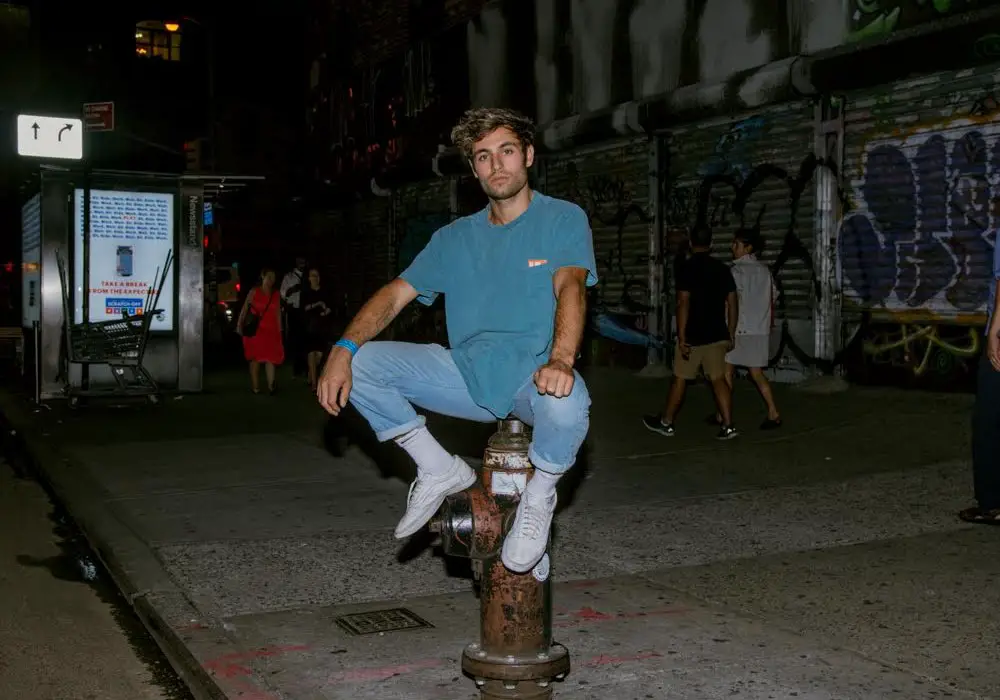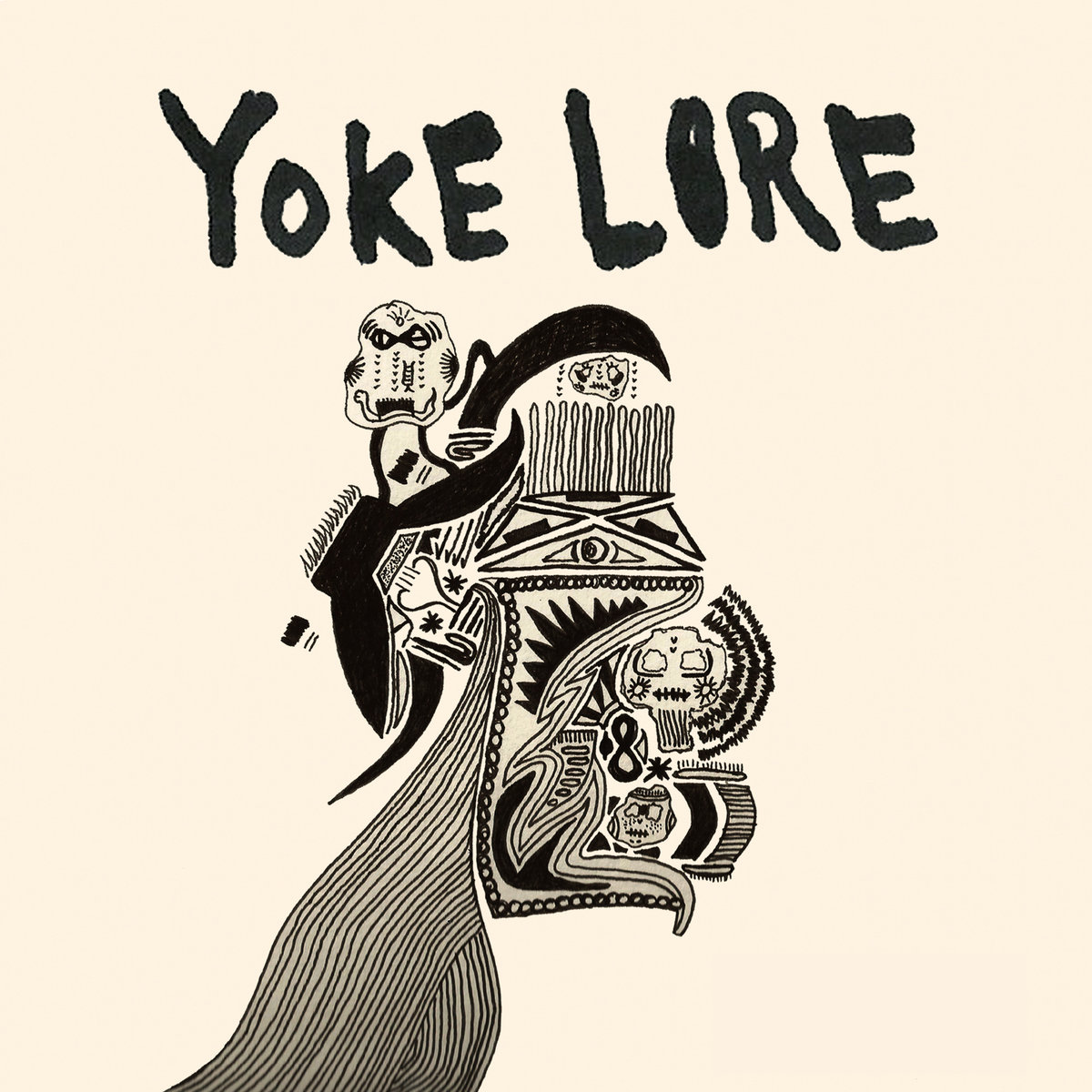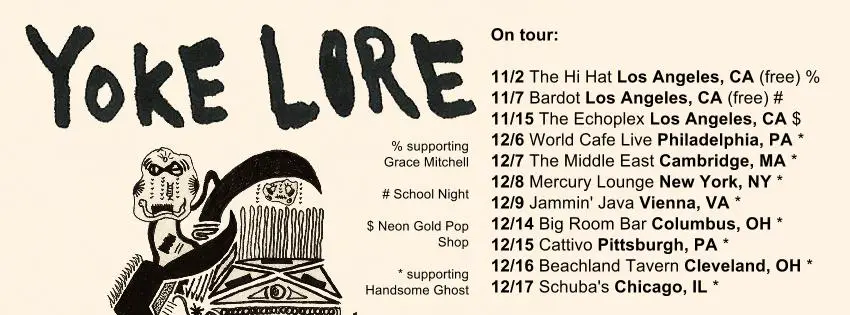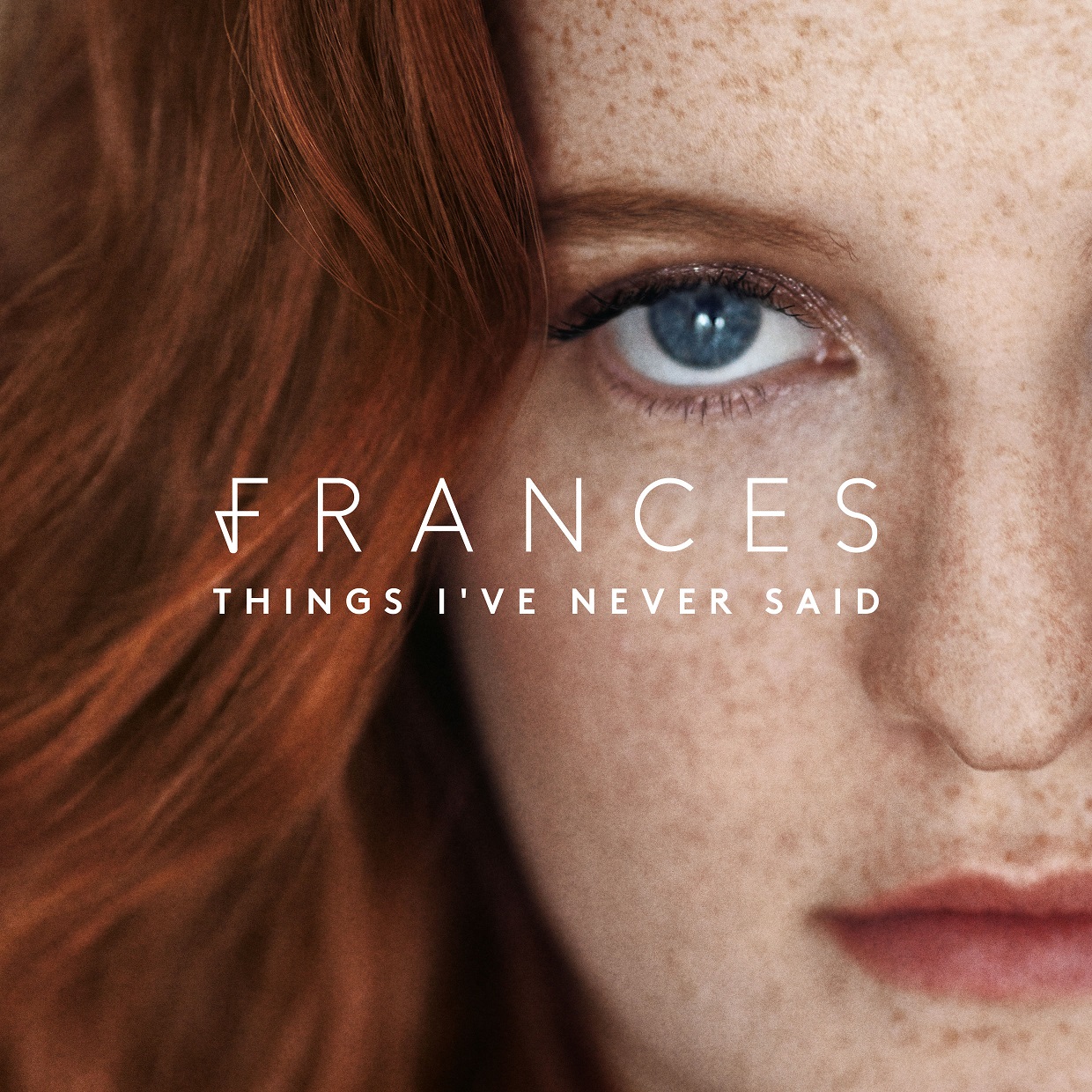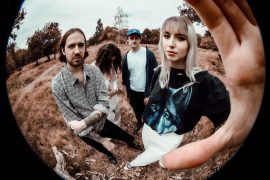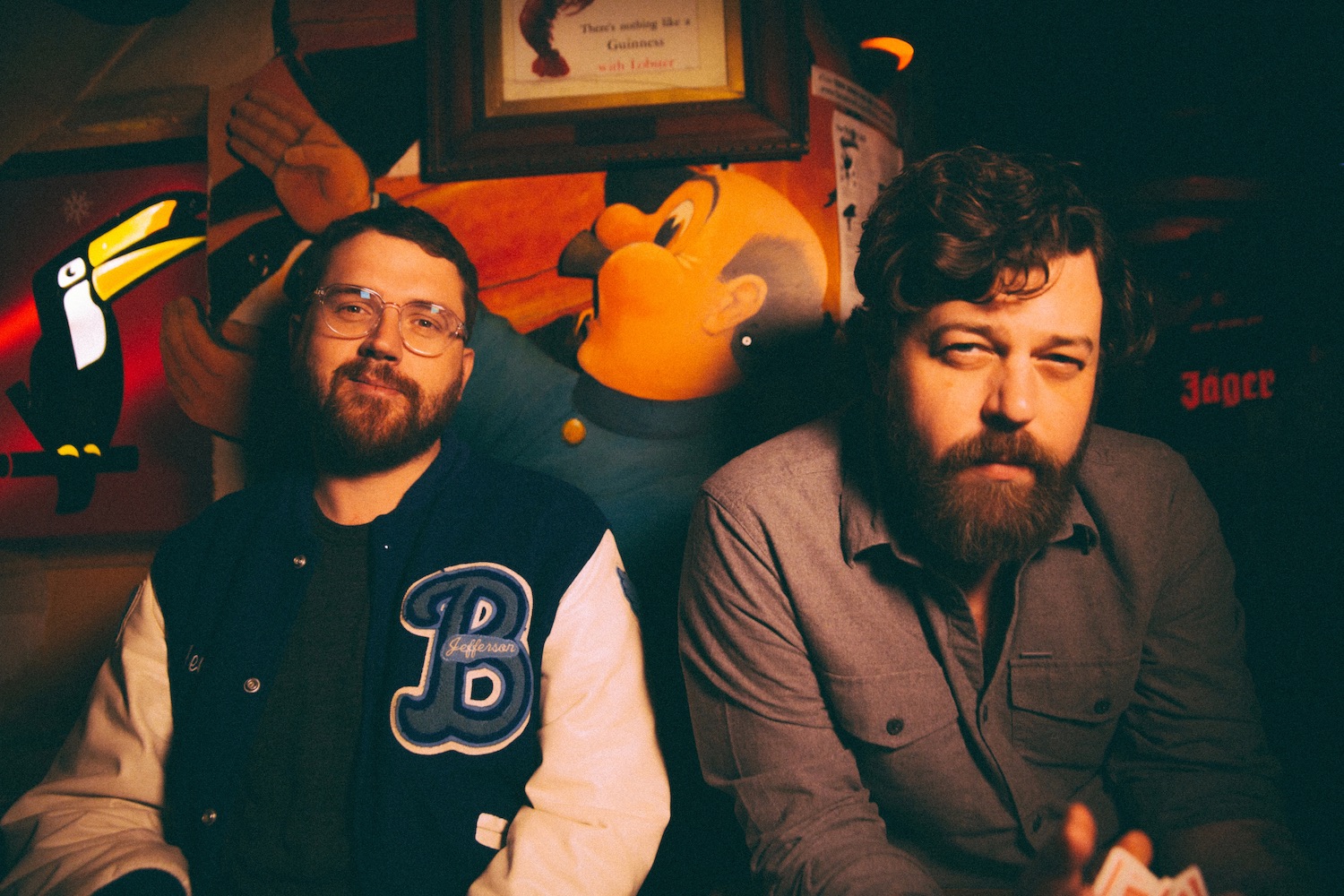I’m interested in telling stories about how things are connected and how I’m connected to people and things and ideas.
To tell a successful story, one must be engaging in almost every way. Finding one’s “voice” is what truly matters; be it in writing, in music, in art, or otherwise. It is important to find a balanced dichotomy between being meaningful and being interesting — as simple as it sounds, it is not usually an easy feat. Oftentimes, the best stories come from unapologetic self-expression.
Adrian Galvin, the mastermind behind indie pop/rock gem Yoke Lore, knows a thing or two about performance art. Raised in New York City by artist parents, he’s been constantly consuming and creating throughout his life — something that he knows he can’t take for granted. It is definitively clear that Galvin and Yoke Lore are in search of a greater truth; one that transcends the music altogether. More than just a musician, Galvin is wholly a creative.
Yoke Lore, Galvin’s latest endeavor, seeks out meaning in every facet of its existence. Seamlessly blending together visual and sonic storytelling, Galvin has successfully made Yoke Lore into an enticing artistic brand of its own. With the release of his debut EP in May of this year, entitled Far Shore, Galvin has made it expressly clear that Yoke Lore is going to be something special.
Atwood Magazine recently caught up with Galvin while Yoke Lore supported Elliot Moss on his fall tour. Thoughtful and erudite, Galvin is sagaciously self-aware and careful in his words. His music reflects his personality, too; there is a unique perceptiveness in his lyricism, and each track ultimately exists within its own narrative. There is a tangible, inherent precocity about him; each remark is treated as important as the next.
Listen: “Hold Me Down” – Yoke Lore
[soundcloud url=”https://api.soundcloud.com/tracks/258790577″ params=”auto_play=false&hide_related=false&show_comments=true&show_user=true&show_reposts=false&visual=true” width=”100%” height=”150″ iframe=”true” /]
A CONVERSATION WITH YOKE LORE
Atwood Magazine: So start by telling me a little bit about the origin story, and how you chose the name “Yoke Lore?” It’s very unique; I’m very intrigued by it.
Adrian Galvin: Well, I guess I’ve always been doing this; I’ve always been performing. I was in all types of bands growing up, and I did a number of things. Then in college, I started a band, Walk The Moon, and I was the drummer in that band forever. I left school to do that, and it was great. And they’re great guys, and I love them, but then they started painting their faces and doing stuff I was not really interested in.
How did you get involved with them? They’re all from Ohio, and you’re from Brooklyn, so how did that come together?
Adrian: I went to Kenyon College, and Nick [Petricca] was a senior when I was a freshman, and we were in an a cappella group together. So we met, and we were like, “Oh, yeah,” and so we did that for a couple years. Then I went back to school, and in school I started a group called Yellerkin, which is more folky stuff. We toured with Dr. Dog, and did some fun stuff. Then that kind of fizzled out, because I wanted to do my own thing and not have anyone to compromise with. So we ended that about year ago or so, and now, it’s Yoke Lore.
Here we are! Where did that name come from?
Adrian: A yoke is, generally, anything that kind of binds things together. Lore is like a set of stories. I’m interested in telling stories about how things are connected and how I’m connected to people and things and ideas. I want to develop those connections, and realize them, and learn to use them better, and learn to use them to make me better. It’s a really interesting idea that I want to keep developing through my music and through my writing.
…A lot of art, for me, is a compulsion…
Nice. And your parents are both artists as well, or do some form of art. So you’ve been kind of surrounded by it.
Adrian: Yeah, my mother was a director forever — but she’s now a yoga teacher. My dad was an actor, but now he’s kind of a sculptor.
And you do some visual art as well!
Adrian: Yeah, I draw; I drew the EP cover. So we were brought up going to the ballet, and painting, and doing that sort of stuff. But they’re both very musical people, and they very early on taught us the value of creating, and giving us as kids the power and notion that you can create the world around you with the things that you put into it. So they taught us to make beauty and hopefully make the world more beautiful.
Very nice. So how do you try to incorporate any of the visual art background into your music?
Adrian: I mean, I think it’s all of the same world, you know? It’s a little like, a lot of art, for me, is a compulsion, and just like a skill that I have. It just kind of leaks out of me, it’s not like a choice that I have. And I’m a dancer also; music and dancing is where I’ve found the two pillars of art in my life right now.
Would you ever incorporate dance into your performance?
Adrian: Yeah, for sure. I mean, I move a lot on stage, but it’d be amazing to have background dancers. I try to involve it, too, in my music videos — I did a music video for “Heavy Love” where I’m just dancing around. Every time I go somewhere for dance, I try to couple it with music performance, so I can keep them tied.
Watch: “Heavy Love” – Yoke Lore
So being from New York City, and growing up in that environment, how has that inspired your songwriting?
Adrian: I think the city is really hectic and really hard and pretty dark, and it kind of forces you to consider a lot of things, because you can’t just live and have a good time. It forces you to make decisions about what you value, and because of that, it really forces you to commit to those things. You see it all around: people have their fucking eyes to the pavement, and everyone’s just trying to move, move, move. There’s part of it that’s really invigorating, and I think that I was so, so lucky to grow up in a family where I had the value of art taught to me. Both of my parents are psychoanalysts, and the kind of richness you get from assessing yourself and your own feelings and your struggles and challenges and fears was always part of the dialogue. Remembering yourself and your own propensities and habits and figuring out what they do for you or don’t do for you. I think just the idea of — not so much of exploration, but self-consideration, all the time.
Do you think that reflects in your songs?
Adrian: Yeah, I think that most of what I write about are ideas that I have or feelings that I have that I need to suss out; relationships that I want to articulate better, and ideas that I’m having trouble with, but need to spitball. It all comes from this idea that you really want to be a real person — you have to constantly be challenging yourself, and have learned something from yesterday.
I like that; that’s a really good way to look at it. How would you describe your sound, then? You’ve kind of evolved from a lot of different genres.
Adrian: Yeah, I would mainly just describe it as drum heavy and vocal heavy. I’m really drawn to tribal drums; I think that there’s a certain incredible power in rhythm. I think it’s all you need, really: rhythm and voice.
I want to make love songs a little bit more interesting.
Do you think that’s helping you differentiate yourself from other artists? Are you trying to differentiate yourself, if that’s not it?
Adrian: I don’t know if I am. Maybe. I don’t know if I want to differentiate myself so much as kind of find and develop a community around the kind of music I make, of people I respect and music that I love. You know, it takes a village. Music is more the people than anything else. So, I think it’s more of a finding factor — and I really want to find and seek out those people who I really love and respect and create with them.
And the whole indie scene is so small and so niche, that I feel like that’s very possible. What is your opinion on the “indie” music scene? Do you think it’s kind of stagnant right now, or do you think it’s moving away from being “independent” at all?
Adrian: I mean like, there will always be kids making music, and there will always be suits who want to take it from them. It’s going to keep happening. The indie scene in the early 2000s is such a specific time and place, and some brilliant music came out of it. But that’s over; it’s done. The labels caught on, streaming services caught on, and now it’s huge. But now it’s moving into other communities, and I’m just as pleased about that. There will always be kids making music that is amazing, that grown-ups don’t know about. That’s never going away; it’s just what type of music it is at the time. I think that hardcore is coming back a little bit, and I think there’s a lot more crossovers now between hip-hop and hardcore right now. I think that might be where this new generation of “indie” is going. There’s something really incredible about the kind of “epic” of punk and the rebellion of hip-hop, and they’ve been really gracefully complementing each other. So I think that’s going to be a really awesome thing to watch happen — not that I’m part of it at all. I respect it, and it’s nice to see it happen.
You could! So tell me a little bit about your EP, the record you put out in May. How did it come about, how did you decide which songs you were going to put on, and what kind of emotions were you trying to evoke with the final product?
Adrian: The idea of Far Shore — the “knowledge of the far shore” is a Daoist concept; it’s their term for enlightenment and nirvana. And I guess with these songs, they’re all about relationships, but me in those relationships, and how I use relationships to write about myself. I don’t want to seem like I’m manipulating or using people, but that’s where you really get information, when you bounce yourself off of other people. So all of these songs are about relationships, but really about what I’ve taken from them and how they’ve challenged me in certain ways. I want to make love songs a little bit more interesting. Love is a beautiful thing, and it’s invigorating.
Do you have a favorite of your songs that you feel especially reflects that feeling?
Adrian: Of my songs? I don’t know — I feel like they all have a certain image to them. I think “Safety” is a good song. I think it communicates a realness. To me, it’s really tragic; knowing that I need to be kept safe, but I want to keep someone else safe, and knowing that I’m not going to be able to, and it’s just not the right time or place, and being really challenged by that. I get really intensely attached to people and feelings and things.
Listen: “Safety” – Yoke Lore
[soundcloud url=”https://api.soundcloud.com/tracks/262345109″ params=”auto_play=false&hide_related=false&show_comments=true&show_user=true&show_reposts=false&visual=true” width=”100%” height=”150″ iframe=”true” /]
I really see a ton of value in dynamism, and having access to the different parts of yourself.
That’s the whole psychoanalytic thing!
Adrian: Right, but I also know myself and I’m conscious of my propensities and my movements, and sometimes I know when something’s not right. It’s really hard to be your own executioner.
So what’s one big goal that you hope to achieve with Yoke Lore, with this new project -- separate from everything else that you’ve done in the past?
Adrian: I want to do a lot of things. One thing that I’m really interested in is going through the value of male vulnerability. Not in the like, “oh, it’s okay to be sensitive sometimes,” but to really, actually be torn apart, and see the value in weakness. I really see a ton of value in dynamism, and having access to the different parts of yourself. I feel like a lot of times, people get entrenched in their ways. It’s just a human problem; we get attached to the ways we are and the things we do and the habits we have, and I want to develop the idea that we all kind of need to be a bit schizophrenic to be okay. Everyone needs to have these different places to go. There’s a time to be “strong male,” and then there’s a time to be a weak little twelve year old. You need both of those to feel complete.
There’s nothing wrong with showing emotion, and there’s nothing wrong with feeling the need to express yourself.
Adrian: Yeah, for sure. And it’s not even a problem of “needing to,” it’s like, you have to, and if you don’t, then you’re losing.
So why, then, does music matter? Why do you pursue it?
Adrian: Because I have to. That’s it. I can’t do anything else.
Why does it matter, though? Why does music have some sort of importance?
Adrian: It’s weird because like, for me, it’s so personal, and so specific, and I kind of do it almost so that people can take it and make something out of it for themselves. It’s like giving people raw material for them to go and develop themselves with it. Not that I’m this kind of dude who helps people “develop themselves,” but I feel responsible for the knowledge that I have in terms of being raised by artists and psychoanalysts. I studied religion for a long time; I went to India and meditated for a year. I feel responsible for a lot of that knowledge, and a lot of what I found value in in that world. I want to — I guess I kind of see music as a venue that can reach so many people, and it’s a port of creativity. It gives you a huge microphone to tell people about things. I’m just trying to find the biggest soapbox that I can, and give these ideas so that people can really take it and make it part of them. That’s what music is for: so that you can take it, and it means something so specific. I’ve heard people say things about songs that I’ve written and it means something to them that’s so different from me. It’s always completely different, and I really want to focus on that, and really let people know that that’s what my music is for; for them to rip it apart and put it back together.
Music is always subjective; to think otherwise would be deeply misguided. Even within specific genres, music should always have the capability to be interpreted in new and unique ways. A great artist understands this. Adrian Galvin is a great artist. Yoke Lore is a project that relies heavily upon knowledge and perception. Its central narratology is rooted in life, love, and discovering oneself through it all. There is a pursuit for something beyond the basics; something that is uniquely yet ubiquitously comprehensive. Yoke Lore knows that there is, definitively, value in dynamism.
Purchase Far Shore on iTunes here.
Connect with Yoke Lore on Facebook, Twitter, Instagram
Discover more new music on Atwood’s Picks
Cover Photo: Yoke Lore © DeSean McClinton-Holland

